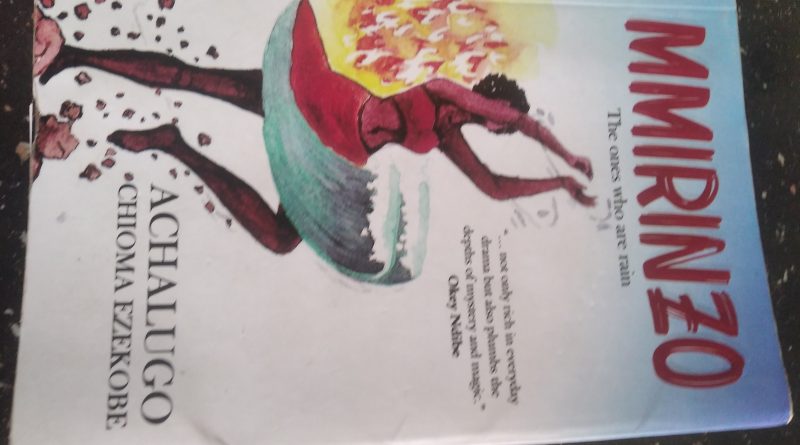Juggling Three Balls: A Review of Mmirinzo by Achalugo
Book Title: Mmirinzo
Author: Achalugo Chioma Ezekobe
Length: 283
Genre: African Speculative Fiction
Publisher/ Year: Winepress/ 2020
Source: Got a copy from a friend
Reviewed by: Ernest O. Ògúnyẹmí
Mmirinzo by Achalugo begins simply. Olivia will be twenty-eight in a few months. She has bucket lists to tick before her twenty-eight birthday, and her younger sister, Nwanneka’s wedding, is just around the corner.
Things are going well until she starts dropping unconscious anytime she sees moving water, and her very fantastical dreams keep getting intense. The fainting and the dreams become so serious that she realizes she needs answers.
That sets us up for an interesting novel, one that would be difficult to put down. And, yes, Achalugo does not disappoint. Her writing is fast-paced enough.
However, the strength of this novel lies in how it juxtaposes – like a juggler juggling two oranges, to borrow an analogy from Robert Louis Stevenson – the plain ordinary and the intense magical, without focusing on one at the detriment of the other. Or we might say: To the writer, Mmirinzo isn’t a work of speculative fiction; it is a work of realism. This is because, while this might read to a foreigner (by this I mean, a person not familiar with Igbo metaphysics) as speculative fiction, to a person who is familiar with Igbo worldview and spirituality, this is a realistic work.
Olivia, like the reader, wants answers and she seeks it. Thankfully, she finds answers. However, while finding answers, her relationship with Sir Leo, a colleague, begins to blossom. (Again, the power of Achalugo to balance the ordinary and the magical.) In Olivia’s quest for answers, she has to go back to the village where she must perform some rites and be initiated.
Here is where I must give Achalugo her due as a brilliant, brilliant writer. She unveils the rites of the initiation and the whole process, showing the reader everything it entails in clear prose, so that the reader, like Olivia (who is almost like the reader in every sense), might make their decision about what is being done.
How do I mean?
Turn on your TV and tune in to African Magic Igbo. Almost all the movies you’ll be shown portrays Igbo Spirituality as demonic and show the priests as bloodthirsty and human-flesh-hungry people. However, Achalugo shows us that this is very untrue. That Igbo priests and those who accept the calling of Chukwu, which she writes that each individual chose in the premortal world, are not in anyway bloodthirsty or human-flesh-hungry.
As Onyeka Nwelue wrote in his blurb, reading Achalugo is like “listening to an old woman tell stories.”
“You are not being forced against your will…, yours is a predestined choice, it is what you chose when you stood between the place Chukwu carves us and the wall to the birth canal of your mother.”
“Yes. Just before we are born, we say what we are going to earth to be or do.”
In Mmirinzo by Achalugo, we meet a whole cast of characters who have accepted their callings and are doing what they promised to do in the premortal world, as well as living their normal, every day life.
There is Amaoge, a young, energetic woman who works in Lagos and follows Odinani; Eloka, a priest who lives with his family and works in Abuja; Aunty Afulenu, Olivia’s guide, who is a teacher and an Mmirinzo; and Nosakhare, who runs a corporate business of rain holders and makers. Will Olivia join the list?
By showing these characters who have their normal lives and who still perform their callings, Achalugo adds another one to the two balls she was juggling: defence. She deftly makes a defence for the Igbo (can I say African?) Spirituality, without pushing it. This, in fact, is where her power lies, and, yes, this makes her a writer to watch carefully. She possesses wisdom. As Onyeka Nwelue wrote in his blurb, reading Achalugo is like “listening to an old woman tell stories.”
“Everything you need is primarily in you, for the rest, you can move around with what you need. I set up a place for my Chi where I stay the most, and even at that, I believe I can commune with my Creator, ancestral and guiding spirits, anywhere and anytime.”
Olivia struggled with comprehension.
“Where is God?” Eloka asked.
“Everywhere,” Olivia answered.
“It is there you have your answers.”
She nodded and asked again, “Why did this mmirinzo thing, come to only me? Will it come to my siblings later?”
“I strongly doubt.”
“But we are siblings.”
“That is not enough, ofu nne na amu, ofu chi adighi eke. You can find siblings from the same mother and father and far in behaviour or destinies from one another.”
There is wisdom in Mmirinzo by Achalugo
One thing I also really liked about this book is how Achalugo portrayed Leonard. We meet a guy who doesn’t take the consent of a drunk lady to be consent, because she is drunk. That was a brilliant portrayal, I must say, for, in a way, it is opening up room for conversation about consent.
This novel made me think of Chigozie Obioma‘s most recent novel, An Orchestra of Minorities.
While there are some minor punctuation errors, Mmirinzo is an important contribution to the African speculative fiction canon, especially those that engage with the Igbo worldview. This novel made me think of Chigozie Obioma‘s most recent novel, An Orchestra of Minorities. While Mmirinzo does not have the range of Chigozie Obioma’s book, it comes close in its case for the relevance of the Igbo worldview.
Mmirinzo by Achalugo is an important debut.




Pingback: The TU Dublin Short Story Competition/ How To Submit (€900 + publication) - Creative Writing News
Pingback: Query Letter Blurb Contest/ How to Submit (Prize: $500) - Creative Writing News